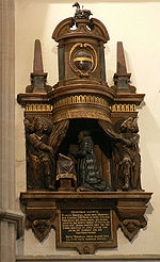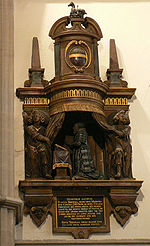
Eubule Thelwall
Encyclopedia

House of Commons of England
The House of Commons of England was the lower house of the Parliament of England from its development in the 14th century to the union of England and Scotland in 1707, when it was replaced by the House of Commons of Great Britain...
between 1624 and 1629. He was principal of Jesus College, Oxford
Jesus College, Oxford
Jesus College is one of the colleges of the University of Oxford in England. It is in the centre of the city, on a site between Turl Street, Ship Street, Cornmarket Street and Market Street...
from 1621 to 1630.
Life
Thelwall was the fifth son of John Wynne Thelwall. He was educated at Westminster SchoolWestminster School
The Royal College of St. Peter in Westminster, almost always known as Westminster School, is one of Britain's leading independent schools, with the highest Oxford and Cambridge acceptance rate of any secondary school or college in Britain...
and was a scholar at Trinity College, Cambridge
Trinity College, Cambridge
Trinity College is a constituent college of the University of Cambridge. Trinity has more members than any other college in Cambridge or Oxford, with around 700 undergraduates, 430 graduates, and over 170 Fellows...
, where he received his BA
Bachelor of Arts
A Bachelor of Arts , from the Latin artium baccalaureus, is a bachelor's degree awarded for an undergraduate course or program in either the liberal arts, the sciences, or both...
in 1577. Thelwall went to Oxford on 14 July 1579, and was awarded MA
Master of Arts (Oxbridge)
In the Universities of Oxford, Cambridge and Dublin, Bachelors of Arts of these universities are admitted to the degree of Master of Arts or Master in Arts on application after six or seven years' seniority as members of the university .There is no examination or study required for the degree...
on 13 June 1580. He was Chief Master of the Alienation office from 1579 to 1599 and was called to the bar in 1599. On 8 March 1605, he was appointed steward and recorder of Ruthin for life. He built the house of Plas Coch
Plas Coch
Plas Coch is an unofficial area in the Wrexham County Borough of Wales. It lies to the north-west part of the Welsh town of Wrexham. The area was originally known as lower Stansty however in more recent years the use of 'Plas Coch' is more common.-Geography:...
and on 28 December 1607 he received a joint grant of the office of Prothonotary and Clerk of the Crown in Anglesey, Carnarvonshire, and Merionethshire for life, in reversion after the death of Richard Fowler. He became a member of Gray's Inn
Gray's Inn
The Honourable Society of Gray's Inn, commonly known as Gray's Inn, is one of the four Inns of Court in London. To be called to the Bar and practise as a barrister in England and Wales, an individual must belong to one of these Inns...
on 16 June 1612. From 1617 to 1630 he was a Master in Chancery.
Thelwall became Principal of Jesus College, Oxford
Jesus College, Oxford
Jesus College is one of the colleges of the University of Oxford in England. It is in the centre of the city, on a site between Turl Street, Ship Street, Cornmarket Street and Market Street...
in 1621, and remained in this post until his death. He was knighted on 29 June 1619. In 1622, he succeeded in securing a new charter and statutes for the college from James I
James I of England
James VI and I was King of Scots as James VI from 24 July 1567 and King of England and Ireland as James I from the union of the English and Scottish crowns on 24 March 1603...
, having spent £5,000 on the hall and chapel, which earned him the title of its second founder. In 1624, he was elected Member of Parliament
Member of Parliament
A Member of Parliament is a representative of the voters to a :parliament. In many countries with bicameral parliaments, the term applies specifically to members of the lower house, as upper houses often have a different title, such as senate, and thus also have different titles for its members,...
for Denbighshire
Denbighshire (UK Parliament constituency)
Denbighshire was a county constituency in Denbighshire, in north Wales, from 1542 to 1885.- History :From 1542, it returned one Member of Parliament , traditionally known as the knight of the shire, to the House of Commons of the Parliament of England until 1707, then to the Parliament of Great...
. He was treasurer of Gray's Inn in 1625. In 1626 he was elected MP for Denbighshire again. He was re-elected MP for Denbighshire in 1628 and sat until 1629 when King Charles decided to rule without parliament for eleven years.
Thelwall died on 8 October 1630, aged 68 and was buried in Jesus College Chapel where a monument was erected to his memory by his brother Sir Bevis Thelwall (Page of the King's Bedchamber and Clerk of the Great Wardrobe). Another brother Simon was also MP for Denbughshire.
Thelwall never married, and left his estate (Plas Coch in the parish of Llanychan, Denbighshire) to his nephew John. There is a picture of him as a child in Jesus College.

